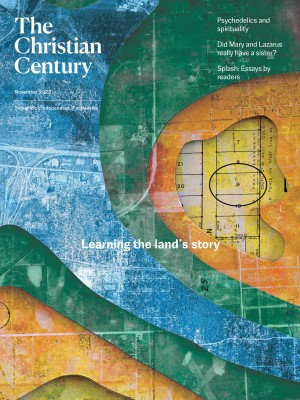November 26, Reign of Christ A (Matthew 25:31–46)
Do we understand how our actions may shape the fate of a neighbor?
His name is Henry James. Henry was only 20 years old in 1981 when, after helping a neighbor repair his car, he was misidentified as the man who attacked that neighbor’s wife. Although the woman initially stated that she didn’t know her attacker, she later picked Henry—a neighbor with whom she was acquainted—from a photo lineup. The evidence that would have exonerated him—results of serological testing that excluded him as the attacker—was not presented to the judge or jury by Henry’s court-appointed lawyer.
Henry was tried, convicted, and sentenced to life in prison without parole for a crime he did not commit.
For the next 30 years, Henry persevered through the harsh conditions of the Louisiana State prison at Angola. For about ten of those years he labored in the prison fields, from sunup to sundown, picking cotton, potatoes, tomatoes, okra, cabbage, greens, and other crops, earning a maximum of four cents an hour. (Because the 13th Amendment abolished slavery “except as a punishment for crime whereof the party shall have been duly convicted,” Angola’s wage is believed to be legal.) He tried to avoid any infraction that could land him in solitary confinement. For 30 years, he missed out on his children’s lives and on finding a vocation for himself.
Read our latest issue or browse back issues.
Unable to read or write well, Henry worked to teach himself those skills so that he could one day write to innocence teams to ask for help. Along the way he learned that he was a pretty decent woodworker, able to craft a variety of furnishings. Word spread about his woodworking abilities, and he was able to earn a few dollars to help his family.
Henry was willing to toe the line and do whatever it took to prove his innocence, once and for all.
By 2005 he’d heard of the Innocence Project and wrote to ask for help. The national organization, together with the Innocence Project New Orleans, began the search for evidence in his case but were told that it had been lost. Neither Henry nor the Innocence Project gave up hope. By 2010, the Innocence Project filed a motion to compel a search for the missing evidence from Henry’s case. A Louisiana crime lab official named Milton Dureau searched for the evidence but turned up nothing.
A year later, while searching for an evidence file for another case, Dureau stumbled upon Henry’s file and the evidence. The long-awaited DNA testing confirmed that Henry was not the attacker. He was freed.
With no money or even photo identification, and with only the few pieces of clothing he’d been given by the lawyers representing him, Henry found a home at a nonprofit called Resurrection after Exoneration, which provides transitional housing and supportive resources for six months to a year for newly released inmates. Resurrection’s touch is personal: its capacity is limited to three people at a time. Henry was the 15th person to reside there.
Henry is, to date, the longest-serving prisoner to be exonerated in Louisiana. He had been inside a prison cell longer than he had been alive before he was imprisoned.
“Truly I tell you, just as you did it to one of the least of these who are members of my family, you did it to me. . . . Truly I tell you, just as you did not do it to one of the least of these, you did not do it to me.” Jesus tells a parable in Matthew 25 that leaves us with stinging words about our actions. Can we see Jesus in the faces of neighbors who may look different, speak a different language, have suffered in ways we cannot comprehend? Do we see all of our neighbors as family, interconnected with us to our Creator? Do we understand how our actions may shape the fate of a neighbor? Do we believe that the ways in which we respond to the needs of the suffering around us reflect the ways in which we respond to the Creator?
Henry James was freed because no one gave up—not Henry, not the Innocence Project, not a crime lab official who recognized the evidence from Henry’s case when he found it misfiled. Henry was freed because he was visited in a prison. Henry was freed because lawyers listened and persevered in the search for evidence that could exonerate him. Henry was clothed because his legal team knew he couldn’t be naked. Henry was sheltered because a nonprofit provided a true home for him—and time for him to be introduced to a society that he didn’t even know.
Henry moved on to freedom because someone was able, at last, to look beyond accusations and see the image and likeness of the Creator in this neighbor, and refused to give up on him.






